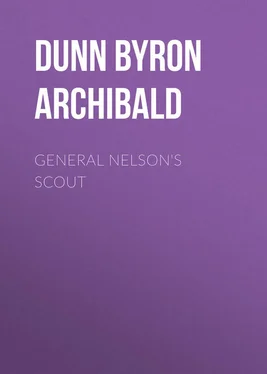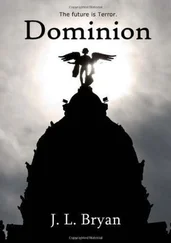Byron Dunn - General Nelson's Scout
Здесь есть возможность читать онлайн «Byron Dunn - General Nelson's Scout» — ознакомительный отрывок электронной книги совершенно бесплатно, а после прочтения отрывка купить полную версию. В некоторых случаях можно слушать аудио, скачать через торрент в формате fb2 и присутствует краткое содержание. Издательство: Иностранный паблик, Жанр: foreign_antique, foreign_prose, на английском языке. Описание произведения, (предисловие) а так же отзывы посетителей доступны на портале библиотеки ЛибКат.
- Название:General Nelson's Scout
- Автор:
- Издательство:Иностранный паблик
- Жанр:
- Год:неизвестен
- ISBN:нет данных
- Рейтинг книги:4 / 5. Голосов: 1
-
Избранное:Добавить в избранное
- Отзывы:
-
Ваша оценка:
- 80
- 1
- 2
- 3
- 4
- 5
General Nelson's Scout: краткое содержание, описание и аннотация
Предлагаем к чтению аннотацию, описание, краткое содержание или предисловие (зависит от того, что написал сам автор книги «General Nelson's Scout»). Если вы не нашли необходимую информацию о книге — напишите в комментариях, мы постараемся отыскать её.
General Nelson's Scout — читать онлайн ознакомительный отрывок
Ниже представлен текст книги, разбитый по страницам. Система сохранения места последней прочитанной страницы, позволяет с удобством читать онлайн бесплатно книгу «General Nelson's Scout», без необходимости каждый раз заново искать на чём Вы остановились. Поставьте закладку, и сможете в любой момент перейти на страницу, на которой закончили чтение.
Интервал:
Закладка:
"You are right," said Fred, advancing on the man, "when you say all Kentuckians are not cowards. Some of them still have courage to resent an insult, especially when it is offered by a cur," and he dealt the man a blow across the face with his riding-whip with such force as to leave an angry, red mark.
The man howled with pain and rage, and attempted to draw a revolver, but stout hands laid hold of him, and he was dragged blaspheming away.
Meanwhile it looked as if there might be a riot. Some were hurrahing for the boy; others were shaking their heads and demanding that Fred further give an account of himself. He had been called a Lincolnite, and that was enough to damn him in the eyes of many.
"What is all this fuss about?" cried a commanding looking young man, dressed in the uniform of a lieutenant of the Confederate army, pushing his way through the crowd.
"Oh, this hyear young feller struck Bill Pearson across the face with his ridin'-whip for callin' him a Lincolnite and a liah," volunteered a seedy, lank looking individual.
"Which seems full enough provocation for a blow. Bill is fortunate he hasn't got a hole through him," responded the young lieutenant.
"But maybe he is a Lincolnite," persisted the seedy individual. "He said Kentuck wouldn't 'cede, and that they was raisin' sogers to help whip we 'uns."
"How is it, my boy?" asked the lieutenant, turning to Fred. "Who are you, and where did you come from?"
Fred explained what had happened; how he had been asked for news from Kentucky, and that he had told them only the truth. He then gave his name, and said he was on his way to Nashville to visit his uncle, Charles Shackelford.
"Fellow-citizens," said the young officer in a voice that at once commanded attention, "this young man informs me that he is a nephew of Major Charles Shackelford of Nashville, who is now engaged in raising a regiment for the Confederate service. No nephew of his can be a Lincolnite. (Here Fred winced.) As for the news he told, unfortunately it's true. Kentucky, although thousands of her gallant sons have joined us, still clings to her neutrality, or is openly hostile to us. It is true, that a renegade Kentuckian by the name of Nelson is enlisting troops for the Yankees right in the heart of Kentucky. But I believe, almost know, the day is not distant, when the brave men of Kentucky who are true to their traditions and the South will arise in their might, and place Kentucky where she belongs, as one of the brightest stars in the galaxy of Confederate States. In your name, fellow-citizens, I want to apologize to this gallant young Kentuckian for the insult offered him."
The young lieutenant ceased speaking, but as with one voice, the multitude began to cry, "Go on! go on! A speech, Bailie, a speech!"
Thus abjured, Lieutenant Bailie Peyton, for it was he, mounted a dry-goods box, and for half an hour poured forth such a torrent of eloquence that he swayed the vast audience, which had gathered, as the leaves of the forest are swayed by the winds of heaven.
He first spoke of the glorious Southland; her sunny skies, her sweeping rivers, her brave people. He pictured to them the home of their childhood, the old plantation, where slept in peaceful graves the loved ones gone before.
Strong men stood with tears running down their cheeks; women sobbed convulsively. "Is there one present that will not die for such a land?" he cried in a voice as clear as a trumpet, and there went up a mighty shout of "No, not one!"
He then spoke of the North; how the South would fain live in peace with her, but had been spurned, reviled, traduced. Faces began to darken, hands to clench. Then the speaker launched into a terrific philippic against the North. He told of its strength, its arrogance, its insolence. Lincoln was now marshaling his hireling hosts to invade their country, to devastate their land, to desecrate their homes, to let loose their slaves, to ravish and burn. "Are we men," he cried, "and refuse to protect our homes, our wives, our mothers, our sisters!"
The effect was indescribable. Men wept and cried like children, then raved and yelled like madmen. With clenched hands raised towards heaven, they swore no Yankee invader would ever leave the South alive. Women, with hysterical cries, beseeched their loved ones to enlist. They denounced as cowards those who refused. The recruiting officers present reaped a rich harvest. As for Fred, he stood as one in a trance. Like the others, he had been carried along, as on a mighty river, by the fiery stream of eloquence he had heard. He saw the Southland invaded by a mighty host, leaving wreck and ruin in its wake. He heard helpless women praying to be delivered from the lust of brutal slaves, and raising his hand to heaven he swore that such things should never be.
Then came the reaction. His breast was torn with conflicting emotions, he knew not what to think. In a daze he sought his horse. A pleasant voice sounded in his ear.
"I think you told me you were going to Nashville." It was Bailie Peyton who spoke.
"Yes, sir."
"It is getting late. Will you not go with me to my father's and stay all night, and I will ride with you to Nashville in the morning?"
Fred readily consented, for he was weary, and he also wanted to see more of this wonderful young orator.
Colonel Peyton, the father of Bailie Peyton, resided some three miles out of Gallatin on the Nashville pike, and was one of the distinguished men of Tennessee. He opposed secession to the last, and when the State seceded he retired to his plantation, and all during the war was a non-combatant. So grand was his character, such confidence did both sides have in his integrity, that he was honored and trusted by both. He never faltered in his love for the Union, yet did everything possible to save his friends and neighbors from the wrath of the Federal authorities. It was common report that more than once he saved Gallatin from being burned to the ground for its many acts of hostility to the Union forces. War laid a heavy hand on Colonel Peyton; and his son the apple of his eye was brought home a corpse. Even then Colonel Peyton did not complain. He bound up his broken heart, and did what he could to soothe others who had been stricken the same as he.
Fred was given a genuine Southern welcome at the hospitable mansion of Colonel Peyton. As for Bailie, the younger members of the household went wild over him, even the servants wore a happier smile now "dat Massa Bailie had cum."
After supper the family assembled on the old-fashioned porch to enjoy the cool evening air, and the conversation, as all conversations were in those days, was on the war. Bailie was overflowing with the exuberance of his spirits. He believed that the victory at Bull Run was the beginning of the end, that Washington was destined to fall, and that President Davis would dictate peace from that city. He saw arise before him a great nation, the admiration of the whole world; and as he spoke of the glory that would come to the South, his whole soul seemed to light up his countenance.
Throughout Bailie's discourse, Colonel Peyton sat silent and listened. Sometimes a sad smile would come over his features at some of his son's witty sallies or extravagant expressions.
Bailie seeing his father' dejection, turned to him and said:
"Cheer up, father; I shall soon be back in Nashville practicing my profession, the war over; and in the greatness and grandeur of the South you will forget your love for the old Union."
The colonel shook his head, and turning to Fred, began to ask him questions concerning Kentucky and the situation there. Fred answered him truthfully and fully to the best of his knowledge. Colonel Peyton then said to his son:
"Bailie, you know how dear you are to me, and how much I regret the course you are taking; yet I will not chide you, for it is but natural for you to go with the people you love. It is not only you, it is the entire South that has made a terrible mistake. That the South had grievances, we all know; but secession was not the cure. Bailie, you are mistaken about the war being nearly over; it has hardly begun. If Beauregard ever had a chance to capture Washington, that chance is now lost by his tardiness. The North has men and money; it will spare neither. You have heard what this young man has said about Kentucky. He has told the truth. The State is hopelessly divided. Neither side will keep up the farce of neutrality longer than it thinks it an advantage to do so. When the time comes, the Federal armies will sweep through Kentucky and invade Tennessee. Their banners will be seen waving along this road; Nashville will fall."
Читать дальшеИнтервал:
Закладка:
Похожие книги на «General Nelson's Scout»
Представляем Вашему вниманию похожие книги на «General Nelson's Scout» списком для выбора. Мы отобрали схожую по названию и смыслу литературу в надежде предоставить читателям больше вариантов отыскать новые, интересные, ещё непрочитанные произведения.
Обсуждение, отзывы о книге «General Nelson's Scout» и просто собственные мнения читателей. Оставьте ваши комментарии, напишите, что Вы думаете о произведении, его смысле или главных героях. Укажите что конкретно понравилось, а что нет, и почему Вы так считаете.












